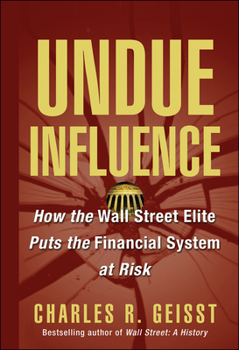Undue Influence: How the Wall Street Elite Puts the Financial System at Risk
Select Format
Select Condition 
Book Overview
A critical look at over 80 years of conflict, collusion, and corruption between financiers and politicians
Undue Influence paints a vivid portrait of the dealings between "the few", in this case members of Congress, the banking community, and the Fed, and sheds light on how radical new deregulatory measures could be introduced by unelected officials and then foisted upon Congress in the name of progress. In the process, the background of the new financial elite is examined-because they are markedly different than their predecessors of the 1920s and 1930s. Undue Influence also brings readers up to speed on other important issues, including how the financial elite has been able to perpetuate itself, how the markets lend themselves to these special interest groups, and how it is possible that after 80 years of financial regulation and regulatory bodies the same problems of financial malfeasance and fraud still plague the markets.
Charles R. Geisst (Oradell, NJ) is the author of 15 books, including Wheels of Fortune (0-471-47973-X), Deals of the Century (0-471-26397-4) and the bestsellers Wall Street: A History and 100 Years of Wall Street. Geisst has taught both political science and finance, worked in banking and finance on Wall Street and in London, as well as consulted. His articles have been published in the International Herald Tribune, Neue Zurcher Zeitung, Newsday, Wall Street Journal, and Euromoney.
Undue Influence paints a vivid portrait of the dealings between "the few", in this case members of Congress, the banking community, and the Fed, and sheds light on how radical new deregulatory measures could be introduced by unelected officials and then foisted upon Congress in the name of progress. In the process, the background of the new financial elite is examined-because they are markedly different than their predecessors of the 1920s and 1930s. Undue Influence also brings readers up to speed on other important issues, including how the financial elite has been able to perpetuate itself, how the markets lend themselves to these special interest groups, and how it is possible that after 80 years of financial regulation and regulatory bodies the same problems of financial malfeasance and fraud still plague the markets.
Charles R. Geisst (Oradell, NJ) is the author of 15 books, including Wheels of Fortune (0-471-47973-X), Deals of the Century (0-471-26397-4) and the bestsellers Wall Street: A History and 100 Years of Wall Street. Geisst has taught both political science and finance, worked in banking and finance on Wall Street and in London, as well as consulted. His articles have been published in the International Herald Tribune, Neue Zurcher Zeitung, Newsday, Wall Street Journal, and Euromoney.
Format:Hardcover
Language:English
ISBN:0471656631
ISBN13:9780471656630
Release Date:November 2004
Publisher:Wiley
Length:352 Pages
Weight:1.55 lbs.
Dimensions:1.1" x 6.3" x 9.2"
Related Subjects
Business Business & Finance Business & Investing Business Law Economic History Economic Policy Economic Policy & Development Economics Finance Franchising Government Investing Investments & Securities Law Political Science Politics & Government Politics & Social Sciences Popular Economics Public Policy Social Sciences StocksCustomer Reviews
1 rating
Great background for regulation/deregulation
Published by Thriftbooks.com User , 19 years ago
Professor Geisst has done a great job of making all of the confusion about the regulation and deregulation of Wall Street and the banks clearer. His account of the trend toward freeing the banks from the 1930's laws is very valuable because it shows the behind the secenes working of the different interested parties. The whole debate is part of the larger movement toward reinterpreting the past in a more conservative fashion and I found the book interesting for that reason alone. Reading this, I get the impression that conservatives reacted toward deregulation in the 1980s as strongly as the radicals did for regulation in the 1930s but the major difference was that the old regulations at least responded to a crisis, trying to fix it. The same cannot be said of the free market movement of the recent period. I found this book very vaulable.





